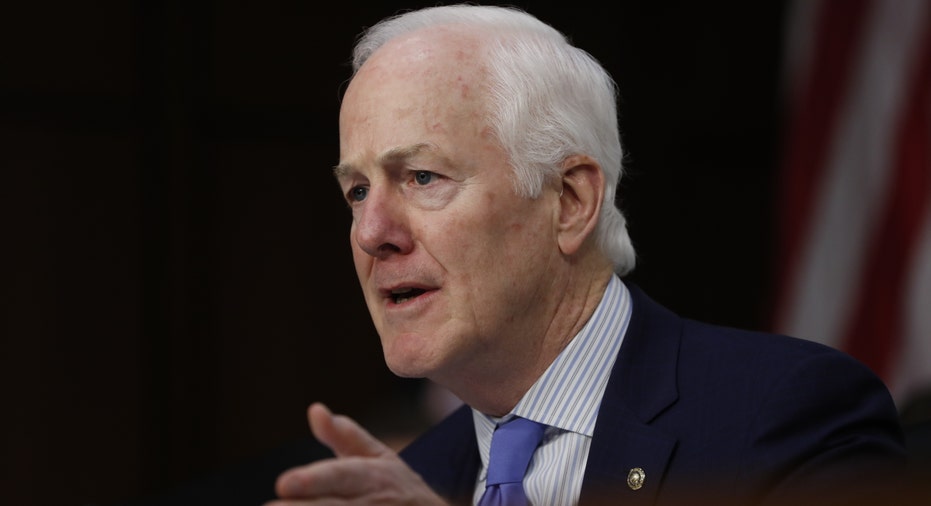Senate conservatives: Ease Obama health care law protections

WASHINGTON – Conservative senators are pushing to diminish insurance coverage requirements imposed by President Barack Obama's health care law as Senate Republicans try fashioning legislation overhauling the nation's health care system.
Their ideas include erasing Obama consumer protections, such as barring higher premiums for people with pre-existing medical conditions, but allowing states to opt into them.
That's a more conservative twist on the health care bill the House approved last week. That measure retains the coverage protections but lets states get waivers to drop some of them.
Conservatives say eliminating the coverage requirements would remove a top reason why premiums rise. Democrats tout the protections as a major Obama achievement that's helped millions of consumers, and some moderate Republicans also oppose removing them.
Conservative senators are also talking about curbing health care tax credits Republicans want and slowing the growth of the Medicaid program for poor and disabled people.
Obama's insurance requirements are among the most popular aspects of his 2010 law, and conservatives' chances of annulling them in a GOP Senate bill are uncertain. They're getting pushback from more centrist Republicans, and the conservatives' effort to void them may not even be allowed into the measure because of special rules the Senate is using.
Win or lose, the effort is one example of the flashpoints GOP senators face early in their closed-door effort to deliver a top priority for themselves and President Donald Trump: scuttling much of Obama's law.
"We're going to leave it up to consumers to decide what they want to buy, what they need, so we're going to eliminate mandates, not add them," No. 2 Senate GOP leader John Cornyn, R-Texas, told reporters Thursday, referring to Obama's coverage requirements. But he added, "We haven't made any decisions."
Conservative Sen. Mike Lee would like to eliminate Obama's requirements that insurers offer coverage to people with pre-existing conditions and charge them the same premiums as healthy customers, a GOP aide said.
The Utah Republican would also erase Obama's mandate that insurers cover a range of services such as maternity care and prescriptions, and the limitation that insurers charge older customers a maximum of triple what they charge younger ones. Lee would let states choose to retain those coverage requirements.
In addition, he'd limit tax credits that help people cover medical costs to amounts equaling whatever taxes people owe. The House bill's credits are refundable, which means they even go to those who owe little or no taxes.
Some conservatives fear that in a bid to win moderate GOP support, the Senate bill will drop House provisions barring the use of the tax credits to buy coverage that includes abortions. Curbing the credits could appeal to abortion foes who want to limit money for such policies, conservatives say.
Sen. Ted Cruz, R-Texas, also wants to curb Obama's coverage requirements, which in an interview this week he called "the prime drivers of premiums skyrocketing." While declining to discuss details, he praised the House for easing some provisions but said there is "considerably more work to be done."
Cruz supports other steps, including letting insurers sell policies across state lines, expanding the use of tax-favored health savings accounts and boosting Medicaid payments to states limiting punitive damages in malpractice lawsuits.
Other Republicans are less enthusiastic about rolling back Obama's coverage provisions.
Sen. Bill Cassidy, R-La., noted Trump comments about protecting people with pre-existing conditions and said, "We have to ask ourselves, are we serious about President Trump's pledge?"
A working group of 13 senators — which Senate Majority Leader Mitch McConnell, R-Ky., has opened to all 52 Senate Republicans — is meeting twice weekly to discuss the bill. All 52 of them discuss the measure at three party lunches weekly.
Lee and Cruz are on the working group. It is unclear how long it will take Republicans to write a bill and push it through the Senate, assuming they can.
When House GOP leaders were struggling to move a health care bill through their chamber, members of the conservative House Freedom Caucus pushed to eliminate Obama's consumer protections. Their demands helped sink an initial version of the legislation.
Under pressure from the White House and top Republicans, they agreed to language letting states escape from some coverage requirements. The House-passed legislation allows state waivers so insurers wouldn't have to cover specific services, could boost prices on older people beyond Obama's limits and could raise premiums on some people with pre-existing conditions who'd led their coverage lapse.
The House-passed bill continues to face strong public opposition, a Quinnipiac University poll released Thursday said.
The poll found that only 21 percent of voters approve of the House-passed bill, while 56 percent disapprove.
A day before House leaders abandoned a planned March vote on their measure amid a rebellion among GOP conservatives and moderates, their bill was viewed favorably by 17 percent.
___
AP reporters Mary Clare Jalonick and Ricardo Alonso-Zaldivar contributed.



















